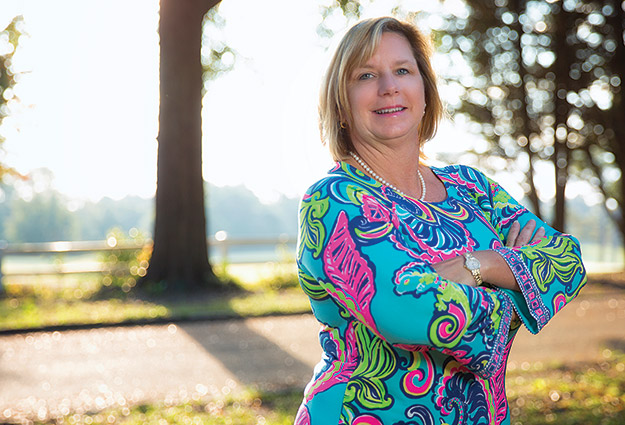Shelter from the Storm

The modest yellow house doesn’t look like a lifesaver. But inside the house, Anne Best, executive director of Family Promise of the Lower Cape Fear, juggles every resource she has to save families who have nowhere else to turn.
Formerly known as the Wilmington Interfaith Hospitality Network (WIHN), the agency is one of 192 affiliates of a national organization. After nineteen years in business, the agency’s name changed this year to encompass all three of its programs to assist homeless families in the area.
The WIHN continues as an emergency shelter program, which houses four families – up to fourteen people. They stay overnight at alternating area worship facilities, sleeping in classrooms for a week at a time, rotating to another worship center on Sunday. WIHN’s trailer brings cots, while the churches provide toiletries and three meals a day. There is no fee to the families.
Opposite the offices, the Day Program operates on Oleander Drive. Families arrive there by van in the morning so children can catch the school bus from the unmarked house that looks like any other house. Parents go to work from there or go to Phoenix Hometown Hires where they learn life skills and gain connections for employment. They must apply for eligable programs such as Medicaid and food stamps. In the evening, the van takes the families back to the host facility.
It’s the little ones who pull Best’s heartstrings the most.
Just over six is the average age of children served by these programs.
“The children are in this through no fault of their own. Trying to get the parents back on their feet and make a better life for the entire family is our goal,” Best says.
Families often end up in a spiraling situation, Best says. An illness can lead to a family member taking on caregiver responsibilities, losing a job, losing housing in the process, and medical bills build on top of that. One thing leads to another.
The third program is interim housing. The agency has three apartments in a house donated for use by First Presbyterian Church. Families can stay in interim housing for three months, paying 25 percent of their housing costs. Based on the family situation, with some referrals coming from the Good Shepherd Center, some assignments can be extended to six months.
In Families Forward Transitional Housing at Willow Pond, the agency owns twelve apartments. Nine are filled solely by referrals from domestic violence shelters. The other three accommodate families needing additional time from the other programs. Contracts cover fifty-two weeks, and residents pay a fee equivalent to 30 percent of their income.
“The Family Promise program is about compassion and accountability. Families are expected to work hard to accomplish their goals and regain housing. Our purpose is not to shelter and feed as many people as possible, but rather to have a lasting positive impact on families that go through our program,” according to agency materials.
An opportunity to give back to the community drew her to the job, Best says.
She has lived in Wilmington since the age of six and married a Wilmington native, so her roots run deep here. After raising children and working a few accounting jobs, she began part time at Family Promise in 2011. With a bachelor’s degree in business administration from University of North Carolina Wilmington, she was tapped for interim director when the position opened in 2013, subsequently assuming the full-time role of executive director.
One of Best’s tasks is to find resources. While procedural support comes from the national agency and financial support from local groups such as United Way of the Cape Fear Area, Landfall Foundation, and Clannad, government funding is drying up as budgets tighten. One large fundraiser gala is held each year in November, but there’s always a need for money to support families, pay utilities, and run the housing units and general operations, she says.
“Part of transitional housing is that it is move-in ready: cooking utensils, dishes, household items, sheets, towels, ironing boards, furniture. When they graduate, they take that with them,” Best says.
Stocking then begins again.
Receipts are given for donations of money or items, and pick-up arrangements can be made for large items such as furniture. For more information, go to familypromiselcf.org.
The emergency housing program runs with the help of over 600 volunteers, equivalent to more than nine full-time employees, while the agency itself has two full-time and one half-time employee.
Family Promise is a unique organization, says Best, and it works with other agencies to serve families from New Hanover, Brunswick and Pender counties.
“We had a 92 percent success rate last year,” Best says, “with families being placed in permanent housing.”
To view more of photographer Chris Brehmer's work, go to www.chrisbrehmerphotography.com